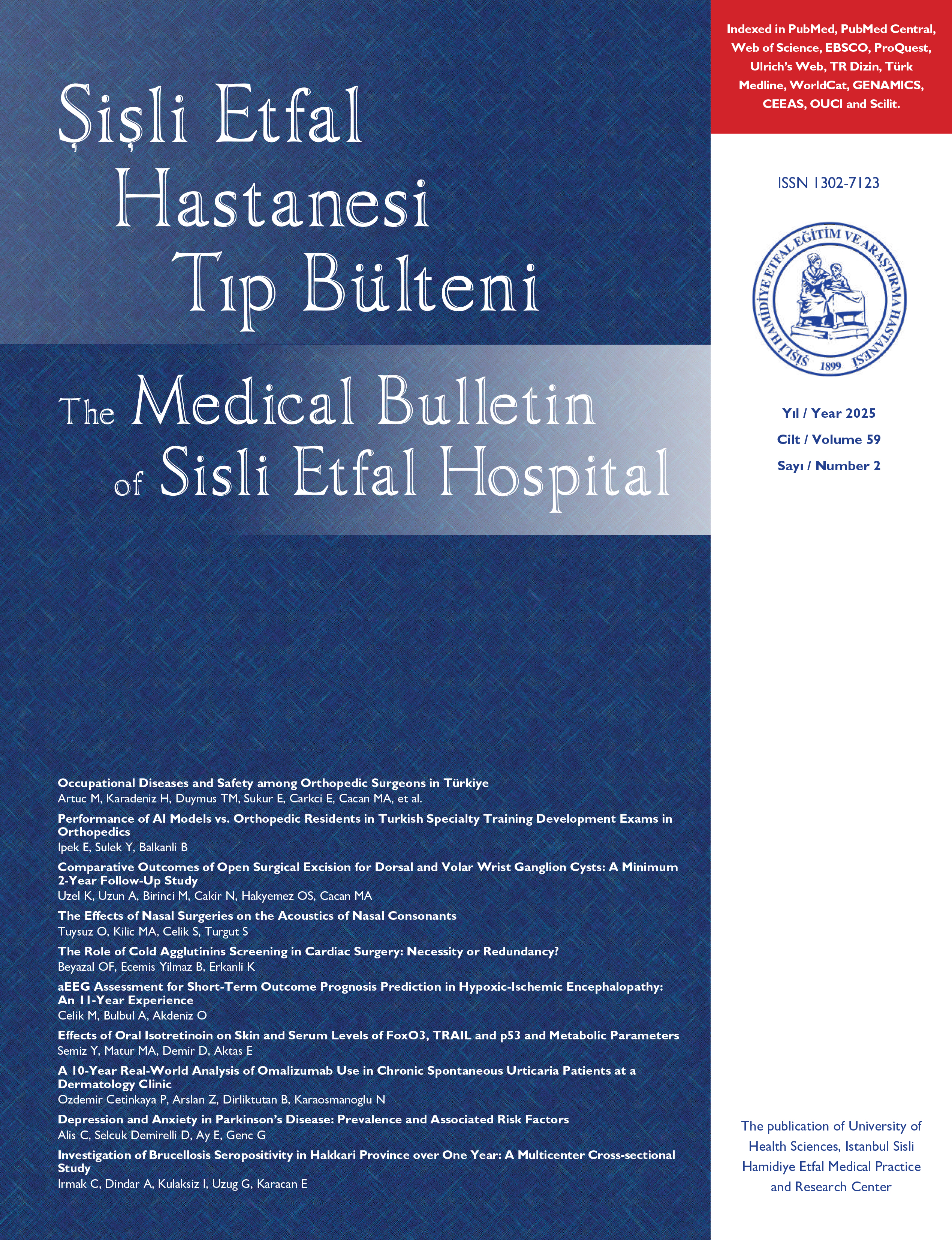
Türkiye'de Aile Hekimlerinin Epilepsi Yönetimi Konusundaki Bilgi ve Öz Yeterlik Düzeyleri: Eğitim Öncesi ve Sonrası Değerlendirme
Gul Yucel1, Burcu Kayhan Tetik2, Ahmet Kadir Arslan3, Yusuf Kucuk41İnönü Üniversitesi Tıp Fakültesi Pediatrik Nöroloji Anabilim Dalı, Malatya, Türkiye2İnönü Üniversitesi Tıp Fakültesi Aile Hekimliği Anabilim Dalı, Malatya, Türkiye
3İnönü Üniversitesi Tıp Fakültesi Biyoistatistik ve Tıbbi Bilişim Anabilim Dalı, Malatya, Türkiye
4İnönü Üniversitesi Tıp Fakültesi Aile Hekimliği Anabilim Dalı, Malatya, Türkiye
Amaç: Aile hekimleri (AH) epilepsili kişilerin bakımından doğrudan sorumludur. Ancak epilepsi hakkındaki eğitimleri yetersiz veya eksik olabilir. Bu çalışmanın amacı AH'ler arasında epilepsi ile ilgili temel bilgi ve öz-yeterlik düzeylerini değerlendirmek ve epilepsiyi yönetme konusunda eğitim ihtiyaçlarını belirlemektir.
Yöntemler: Bu ön test-müdahale-son test çalışmasının örneklemi 60 AH'den oluşmaktadır. AH'ler epilepsi yönetimi konusunda dört saatlik bir eğitime katılmıştır. Eğitimin etkinliği, eğitimden önce ve sonra Epilepsi Bilgi ve Öz-Yeterlik (EBÖY) ölçeği ile değerlendirilmiştir. Ayrıca epilepsi hastalarının takibinde karşılaşılan sorunları ve eğitim ihtiyaçlarını belirlemek için bir anket çalışması yapıldı.
Sonuçlar: Çalışmaya 60 hekim katıldı [37 erkek (%61,7), ortalama yaş 37,97±8,92 yıl ve mesleki süre 80,48±70,59 ay]. AH'lerin toplam EBÖY puanı eğitimden önce 90,23±10,97 iken, eğitimden sonra 112,3±15,26 puana yükseldi (p<0,001). Eğitimden sonra, EBÖY'ün tüm alt bileşenlerinde eğitimden önceye kıyasla anlamlı puan artışları gözlendi. Eğitimden sonra hekimlerin epilepsiye eşlik eden hastalıkları tanıma, antinöbet ilaçlar hakkında yeterli bilgiye sahip olma ve epilepsili hastaları takip etme yeteneklerinde eğitim öncesine göre anlamlı düzeyde iyileşme olduğu görüldü (sırasıyla p<0,001, p=0,001 ve p=0,002).
Sonuç: Bu çalışma, AH'lerin epilepsi yönetimi konusunda eğitime ihtiyaç duyduğunu ve sunulan eğitimin olumlu bir etki sağladığını göstermiştir
Knowledge and Self-Efficacy Levels of Family Physicians on Epilepsy Management in Türkiye: Pre- and Post-Education Evaluation
Gul Yucel1, Burcu Kayhan Tetik2, Ahmet Kadir Arslan3, Yusuf Kucuk41Department of Pediatric Neurology, Faculty of Medicine, Inonu University, Malatya, Turkiye2Department of Family Medicine, Inonu University Medical Faculty, Malatya, Turkiye
3Department of Biostatistics and Medical Informatics, Faculty of Medicine, Inonu University, Malatya, Turkiye.
4Department of Family Medicine, Inonu University Medical Faculty, Malatya, Turkiye
Objectives: Family physicians (FPs) are directly responsible for the care of people with epilepsy. However, their education about epilepsy may be inadequate or lacking. The aim of this study was to assess the basic knowledge and self-efficacy levels regarding epilepsy among FPs and to identify their educational needs in managing epilepsy.
Methods: The sample for this pre-test-intervention-post-test study consisted of 60 FPs. FPs attended a four-hour training on epilepsy management. The effectiveness of the training was assessed with the Epilepsy Knowledge and Self-Efficacy (EKSE) scale before and after the training. In addition, a survey was conducted to determine the problems encountered in the follow-up of epilepsy patients and their training needs.
Results: 60 physicians participated in the study [37 males (61.7%), mean age 37.97±8.92 years and professional duration 80.48±70.59 months]. While the total EKSE score of FPs was 90.23 ± 10.97 before the training, it increased to 112.3±15.26 points after the training (p<0.001). After the training, significant score increases were observed in all subcomponents of the EKSE compared to before the training. After the training, there was a significant improvement in the physicians' ability to recognize diseases accompanying epilepsy, to have sufficient knowledge about antiseizure medications, and to follow up patients with epilepsy compared to before the training (p<0.001, p=0.001, and p=0.002, respectively).
Conclusion: This study demonstrated that FPs have need for education regarding epilepsy management and that the education provided has a positive impact. (SETB-2025-04-081)
Makale Dili: İngilizce



















